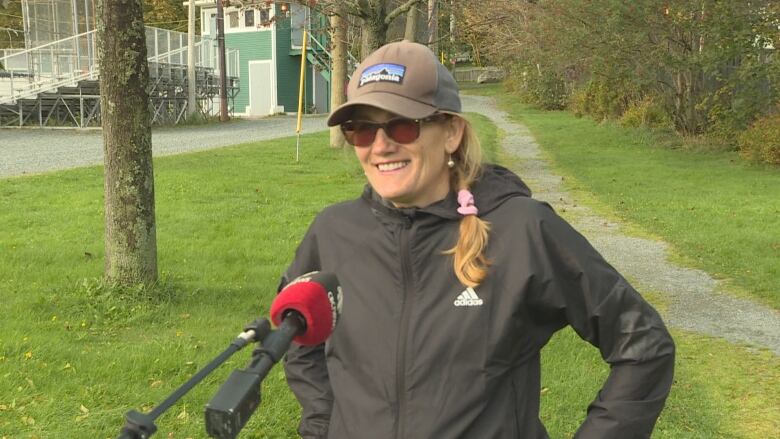Littered masks a growing concern around St. John's, says local runner
Discarded masks are 'all over the place,' Kim Larouche says

A St. John's runner is voicing her concern for the environment while cleaning up dozens of masks littered around the community.
Kim Larouche, a long-distance runner who runs Ironman races and has completed several marathons, collects the discarded masks while on her runs.
"They're not little mice hammocks; they're actually pollution. They're made out of plastics, and God knows how long it takes them to deteriorate," she said.
Larouche said she tries to be as safe as possible while collecting discarded masks over the course of longer runs — storing them in a plastic bag and sanitizing her hands after every one she collects — and began posting her findings on her Instagram page.
"I just thought, 'Oh, I'll pick this one up,' and then I see five or six more on a five[-kilometre] run," she said. "And it just goes on and on.… I've seen up to 50 on a longer run.
"It's all over the place. Downtown, it's on the trails, it's up around Windsor Lake. It's everywhere."

Larouche said she started posting photos on social media to get the word out about how many masks she has seen, and reception from the public has followed a common theme.
"A lot of people are disgusted, for sure," she said. "I'm sure they're disgusted by me picking them up and wondering about my safety. But if they're not safe to be out there, then they probably shouldn't be out there.
"I find it a bit disgusting, so that's part of the reason I'm picking them up."
In a tweet last month, St. John's Coun. Maggie Burton reminded the public to be mindful of where disposable masks end up, as their light weight can allow them to travel in the wind.
Same goes in <a href="https://twitter.com/CityofStJohns?ref_src=twsrc%5Etfw">@CityofStJohns</a> - PLEASE be mindful of the lightweight nature of masks which makes them easier to fly in the wind. Dispose of them properly, and do not litter. <a href="https://t.co/Qd7DcoF7Cf">https://t.co/Qd7DcoF7Cf</a>
—@mmburtonJack Lawson, research scientist for the Department of Fisheries and Oceans, added cutting the mask strings should be done when disposing of a mask, similar to cutting the plastic rings used to package drink cans or bottles.
Back on the running trail, Larouche recommends using a cloth mask to help limit the number of disposable masks that make it into the environment.
"It's so much easier," she said.
"You're reducing the amount of plastics that are in the environment. They're easy to wash [and] it's no different than carrying around a disposable mask."
With files from Jeremy Eaton